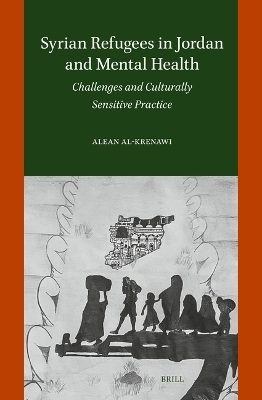
Syrian Refugees in Jordan and Mental Health
Brill (Verlag)
978-90-04-70286-8 (ISBN)
This innovative book provides a thorough and compassionate examination of the lives of Syrian refugees in Jordan, as well as their families. It will equip mental health professionals with the necessary skills to effectively intervene when working with this vulnerable population.
What distinguishes this book is its emphasis on the unique challenges that arise from the relationship between Jordanian locals and Syrian refugees, as well as how mental health practitioners can navigate these complexities. It sheds light on the obstacles that such practitioners face in their work and offers valuable insights into how to overcome them.
Alean Al-Krenawi, Ph.D., is an accomplished academic and researcher who has held several leadership roles in various universities worldwide. He currently serves as the Dean and Professor at the Faculty of Humanities, Social Science, and Cross-Cultural Studies at Algoma University in Ontario, Canada.
Preface
Acknowledgment
List of Figures and Tables
1 Introduction
2 Refugees
1 Refugees—A Global Perspective
2 The Syrian Refugee Crisis
3 Refugee Experiences
4 Refugee Coping Strategies
5 The Economic Cost of Refugees
6 The Social Cost of Refugees
7 Refugees’ Strain on Public Services
8 Refugee Shelter and Housing
9 Refugee Camps
10 Employment among Refugees
11 Early and Forced Marriage
12 Refugee Child Labor
3 The Hashemite Kingdom of Jordan
1 Living Conditions in Jordan
2 Syrian Refugees in Jordan
3 Refugee Living Conditions in Jordan
4 Healthcare for Syrian Refugees
5 Refugee Camps in Jordan
6 Al Zaʾatari Refugee Camp
7 The Ministries and NGO s Combating the Syrian Refugee Crisis
8 UNHCR Involvement in the Syrian Refugee Crisis
9 Jordanian Plan for the Syrian Refugee Crisis in 2015, 2016–2018
10 Economic Implications of the Syrian Refugee Crisis on the Hashemite Kingdom of Jordan
4 Human Rights and Refugees
1 Human Rights in General
2 Human Rights and Refugees
3 Violations of Human Rights & Refugees
4 The Human Right to Healthcare
5 Refugee Healthcare
6 Healthcare Access and Health Concerns among Refugees Living in Camps
7 Mental Health Services in Jordan Provided by local and International NGO s
8 Welfare Support & Accommodations
9 The Human Right to Education
10 Human Rights Violations against Refugee Children
11 The Human Rights Violation of Child Marriage
12 The Human Rights Violations of Child Labor
13 The Violation of Human Rights by Violence & Social Conflict
14 Gender-Based Violence
15 Sexual Violence amongst Syrian Refugees
5 The Psychosocial Impact of Refuge and Migration on Refugees
1 Vulnerability to Mental Health Problems among Refugees
2 Migration Journey
3 Stages of Migration
4 Psychosocial Impacts
5 Mental Health Disorders and Psychosocial Distress
6 PTSD and Social Support
7 Conceptualization of Trauma in the Arab World
8 PTSD Terminology in the Arab World
9 Depression
10 Acculturation among Refugees
11 Religion and Mental Health
12 Gender Differences
13 The Syrian Refugee Crisis and Its Psychosocial Impact
14 Crime Rates among Refugees
15 Syrian Refugee Family Characteristics
16 Refugee Family Functioning
17 Poverty among Refugees
18 The Effect of the COVID-19 Pandemic on Refugees
19 The Psychosocial Impact of Refuge on Adolescents
20 Syrian Refugee Adolescents
21 Adolescents’ Coping Strategies
6 Methodology
1 Study Parts
2 Part One
3 Part Two: Culturally Sensitive Mental Health Practices and Art Therapy
4 Part Three: Psychosocial Gender Differences among Syrian Refugee Adolescents in the Hashemite Kingdom of Jordan
7 Findings and Discussion
1 The Objectives of the Workshop/Training Program on Culturally Sensitive Mental Health Practices
2 Topics Included and Covered in the Workshop/Training Program
3 Characteristics of Arab-Muslim Cultures
4 Patriarchy and Gender Roles
5 Differences in Psychosocial Orientation in Arab Societies
6 Cultural Competence
7 Levels of Cultural Competency
8 Using the Iceberg Model Analogy
9 Cultural Empathy
10 Factors and Attitudes Affecting Help-Seeking in Arab Societies
11 A Collaborative Approach
12 Models of Help-Seeking Processes and Strategies among Arab-Muslim People
13 The Art Therapy Workshop/Training Program
14 Quantitative Study: Gender Differences on the Psychosocial Impact among Syrian Refugee Adolescents
8 Integrating Cultural and Religious Components in Mental Health Practice: Implications for Practice with Arab-Muslim Refugees
1 The Refugee Problem
2 Syrian Culture: Diversity, Religion and Language
3 Syrian Refugees at Risk
4 Forced Displacement
5 Politics and Mental Health
6 Addressing Syrian Refugees’ Mental Health
7 Culturally Responsive Practice
8 Child and Family Traumatic Stress Intervention
9 Culturally Modified Trauma-Focused Treatment
10 Adapted Dialectical Behavior Therapy for Special Populations
11 Barriers to Mental Healthcare Facing Refugees
12 Improving Mental Health Interventions for Refugees
13 E-Mental Health Interventions
14 Multi-component PM+ and Related Programs
15 The STRENGTHS Program
16 Biopsychosocial Model Approach for Non-Western Populations
17 Psychological versus Metaphoric Language
18 Family Therapy with Arab-Muslim Families
19 Key Issues When Working with Arab-Muslim Families
20 Religion as a Coping Strategy
21 Islamic Principles in Treatment with Muslim Clients
22 Treatment Approaches with Arab Communities
23 Resettlement Interventions
24 Difficulties in Treatment
25 Conclusions
9 Conclusion
1 Introduction
2 Underutilization of Mental Health Services by the Syrian Refugees
3 Social Work Perspective and Refugees
4 Culturally Appropriate Intervention
5 Recommendations for Mental Health Practitioners Working with Syrian Refugees
References
Index
| Erscheinungsdatum | 03.10.2024 |
|---|---|
| Verlagsort | Leiden |
| Sprache | englisch |
| Maße | 155 x 235 mm |
| Gewicht | 633 g |
| Themenwelt | Geisteswissenschaften ► Psychologie ► Klinische Psychologie |
| Sozialwissenschaften ► Soziologie ► Spezielle Soziologien | |
| ISBN-10 | 90-04-70286-5 / 9004702865 |
| ISBN-13 | 978-90-04-70286-8 / 9789004702868 |
| Zustand | Neuware |
| Haben Sie eine Frage zum Produkt? |
aus dem Bereich


